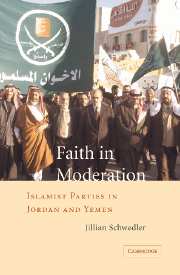Book contents
- Frontmatter
- Contents
- List of Figures
- List of Tables
- Preface
- Acknowledgments
- List of Abbreviations
- Note on Transliterations and Translations
- Faith in Moderation
- 1 Moderation and the Dynamics of Political Change
- 2 Political Liberalization as a Mechanism of Control
- 3 Public Political Space
- 4 Cultural Dimensions of Political Contestation
- 5 Justification and Moderation
- 6 Conclusion: Does Inclusion Lead to Moderation?
- References
- Index
4 - Cultural Dimensions of Political Contestation
Published online by Cambridge University Press: 18 December 2009
- Frontmatter
- Contents
- List of Figures
- List of Tables
- Preface
- Acknowledgments
- List of Abbreviations
- Note on Transliterations and Translations
- Faith in Moderation
- 1 Moderation and the Dynamics of Political Change
- 2 Political Liberalization as a Mechanism of Control
- 3 Public Political Space
- 4 Cultural Dimensions of Political Contestation
- 5 Justification and Moderation
- 6 Conclusion: Does Inclusion Lead to Moderation?
- References
- Index
Summary
In the preceding chapters, I have explored in detail two dimensions of change in Jordan and Yemen that resulted from regime-led political openings: political opportunity structure and internal group practices (organization, decision-making processes, and willingness to forge alliances with rival political actors). Changes in each of these dimensions of public political space have significantly impacted the other. The comparison between the IAF in Jordan and the Islah party in Yemen thus far has highlighted structural dimensions, such as the role and position of the regime in the transition process, whether the regime competes as a party or sits above the field of pluralist political contestation, and the structure of competing factions and level of cohesion within each party. In this chapter, I begin to explore a third component of change, the cultural dimensions of political contestation, focusing on three dominant narratives central to public political debate in both countries: Islam, democracy, and national unity. I examine the ways in which these narratives have created opportunities and constraints for all political actors, but I focus my attention on regimes and Islamist parties. This chapter is devoted to identifying these cultural dimensions of political contestation in Jordan and Yemen and examining how insights from these cases can contribute to a theory that might explain precisely how moderation can take place. Chapter 5 identifies one mechanism for ideological moderation and then examines whether this mechanism was at work within the IAF and the Islah party to explain varying degrees of moderation between the parties.
- Type
- Chapter
- Information
- Faith in ModerationIslamist Parties in Jordan and Yemen, pp. 117 - 148Publisher: Cambridge University PressPrint publication year: 2006

